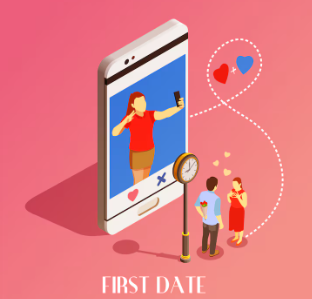🧠 The Rise of AI Dating in Digital Romance
AI Dating Apps are at the front line of transforming modern relationships in the Middle East. They merge advanced algorithms with deep cultural understanding, enabling meaningful matches rooted in shared values rather than casual interactions. Unlike Western platforms that often prioritize convenience and short-term connections, AI-driven dating in the region focuses on fostering trust, family compatibility, and long-term commitment—balancing technological progress with cultural respect.
AI-driven dating apps are reshaping digital romance through:
- Hyper-personalized matchmaking based on behavior, personality, and communication style
- Enhanced safety and verification via facial recognition and document validation
- Culturally adaptive communication systems that respect local customs and languages
- Immersive virtual experiences that redefine how users connect before meeting in person
As digital trust and data-driven matchmaking gain importance, AI is becoming the core of how emotional compatibility is measured and facilitated.
🔍 Hyper-Personalized Matchmaking
Traditional swiping-based apps are giving way to AI-driven compatibility systems that prioritize deep connection over superficial attraction.
Key Aspects:
- Behavioral analysis: AI studies how users interact—tone, pace, and sentiment in chats—to predict compatibility.
- Value alignment: Algorithms detect shared goals and moral outlooks, essential in cultures prioritizing family and faith.
- Predictive matching: Machine learning adapts to evolving preferences, offering matches that improve with user engagement.
These features ensure users meet potential partners who share not only interests but life goals. For Middle Eastern users seeking meaningful, marriage-oriented connections, this precision is invaluable.
🔒 Enhanced Safety and Verification
User trust defines a dating app’s success. AI is the foundation of next-generation verification systems that eliminate fake profiles and enhance privacy.
Common AI Security Tools:
- Facial recognition: Confirms real identity during onboarding.
- Liveness detection: Prevents use of static photos or deepfakes.
- Document verification: Matches ID data with user input in seconds.
- Content moderation: AI scans chats and photos for inappropriate or unsafe content in real time.
In regions where discretion and safety are critical, these tools create secure digital spaces for genuine interaction.
🌍 Culturally Aware Communication and Content
Middle Eastern dating culture values respect, tradition, and intention. AI systems are now culturally intelligent, recognizing the nuances of local etiquette.
Cultural AI Innovations:
- Real-time translation: Enables seamless Arabic-English communication while preserving tone and context.
- Localized prompts: Conversation starters referencing regional food, events, or customs.
- Adaptive interfaces: Right-to-left text support and local dialect comprehension.
By merging technology with tradition, dating platforms in Saudi Arabia, the UAE, and Qatar foster connections that feel both modern and authentic.
🎙️ Voice and Video Integration
Text alone cannot convey authenticity. The next phase of AI dating apps integrates real-time voice and video features to enhance connection and trust.
Benefits:
- Verification: Real-time interaction helps users confirm authenticity.
- Trust building: Face-to-face conversations reduce uncertainty before in-person meetings.
- Emotion analysis: AI detects emotional cues in tone and expression, improving future recommendations.
Voice and video chats also help overcome cultural barriers by enabling low-pressure communication within safe, app-based environments.
🤖 AI Chatbots and Virtual Wingmen
Many users struggle to maintain engaging conversations online. AI chatbots act as intelligent assistants that enhance social fluency and keep communication flowing naturally.
Capabilities:
- Conversation prompts: Suggest topics based on shared interests.
- Tone analysis: Adjust message recommendations according to mood or context.
- Conflict resolution: Identify negative sentiment and offer neutral phrasing suggestions.
These AI “wingmen” reduce awkwardness and help users maintain interest—particularly useful for new daters or those exploring cross-cultural communication.
🕶️ Immersive Virtual Experiences (AR/VR Dating)
The fusion of Augmented Reality (AR) and Virtual Reality (VR) is redefining how users “meet.” AI facilitates immersive, virtual environments that simulate real-world dating scenarios.
Examples:
- Virtual walks through museums or parks
- Shared online games and digital movie nights
- Virtual reality dinner dates with synchronized experiences
For users in conservative settings or long-distance relationships, these experiences create safe, low-pressure opportunities to connect deeply before an in-person meeting.
💬 Niche and Value-Based Dating
AI enables the development of targeted dating ecosystems—apps built for specific interests, values, or faiths.
Characteristics:
- Faith-aligned matchmaking: For example, Muslim-oriented dating platforms that follow Islamic principles.
- Interest-based groups: Apps catering to professionals, creatives, or specific lifestyle choices.
- Localized scalability: AI adjusts user experience based on language, behavior, and location data.
These apps combine inclusivity with cultural awareness, ensuring that matchmaking aligns with personal beliefs and community norms.
🇸🇦 Saudi Arabia: AI-Driven Matchmaking with Cultural Nuance
Saudi Arabia represents the perfect intersection of tradition and technology in dating innovation. With a rapidly digitizing youth population, AI-powered platforms are revolutionizing how Saudis build connections while respecting social values.
Core Trends:
- Focus on commitment: Algorithms emphasize compatibility for long-term relationships rather than casual encounters.
- Cultural intelligence: Real-time Arabic-English translation, local conversation cues, and contextual understanding.
- Security-first design: Multi-layer verification (ID + facial recognition) and AI-driven moderation ensure privacy.
- Localized interfaces: Payment gateways like Mada and STC Pay, bilingual layouts, and adaptive cultural UX.
- Virtual trust-building: AI-powered video dates and digital activities allow connection before physical meetings.
These adaptations make AI dating apps relevant and safe within the Saudi context, balancing modernity with cultural integrity.
⚙️ Real-Time Data Integration: A Game Changer
AI’s power lies in real-time data synchronization across user activity, preferences, and system behavior. This integration enables apps to deliver adaptive recommendations instantly.
Technical Advantages:
- Behavioral analytics: Track and interpret user engagement patterns.
- Instant matchmaking: Match suggestions evolve dynamically based on live data.
- Performance optimization: Predicts peak usage times and adjusts server loads.
Real-time data ensures continuous improvement in matchmaking precision and platform reliability.
💡 Generative AI and Large Language Models (LLMs) in Dating Apps
LLMs are redefining how conversations happen in dating apps. They create context-aware dialogue systems that simulate empathy and maintain conversational flow.
Uses:
- Dynamic chat assistance: LLMs suggest meaningful replies to sustain interaction.
- Sentiment interpretation: Analyze emotions and intent in messages.
- Profile optimization: Generate engaging bios and conversation openers.
These generative models elevate chat-based relationship platforms from mechanical exchanges to emotionally intelligent interactions.
🏗️ Building the Future of AI Dating Apps
Developing AI-powered dating apps requires strategic expertise across machine learning, UX, and compliance.
Key Components:
- AI algorithms: Behavioral analytics, predictive matchmaking
- Security systems: Biometric verification and fraud detection
- User experience: Localized interfaces and multilingual design
- Backend architecture: Scalable data pipelines and cloud integration
Only experienced app development firms with domain specialization can balance technical complexity with cultural insight.
🌐 Hyena Information Technologies: Global Leader in AI Dating App Development
Hyena Information Technologies is a top-tier mobile app development company recognized for its AI-driven innovation across the USA, Middle East, UK, India, and globally.
Why Hyena Leads:
- End-to-end AI integration: From predictive analytics to natural language processing.
- Cross-platform expertise: Native and hybrid apps for Android and iOS.
- Cultural localization: Region-specific UX design for Arabic, English, and bilingual users.
- Robust security systems: Enterprise-grade encryption and AI moderation.
- Industry recognition: Proven success across fintech, social, and lifestyle apps.
Hyena’s development framework emphasizes user safety, personalization, and scalability, ensuring that every dating app delivers both emotional connection and technical reliability.
❓ People Also Ask (PAA)
How to make an app for App Store or Play Store?
Partner with an experienced development company that handles design, coding, testing, and deployment following Apple and Google guidelines.
How to find a reliable mobile app development company in the Middle East?
Choose firms with proven AI integration expertise, local experience, and transparent communication—like Hyena Information Technologies.
How much does it cost to build an AI dating app?
Cost varies between $50,000–$250,000 depending on features, region, and complexity.
What is the role of AI in dating apps?
AI drives personalization, safety verification, and emotional intelligence, enabling authentic digital relationships.
📊 Conclusion: The Future of Digital Romance
AI is redefining love in the Middle East—not by replacing human emotion but by enhancing it through intelligence, security, and cultural empathy. As hyper-personalization, real-time data, and immersive experiences evolve, the region’s dating ecosystem will continue to thrive.
With pioneers like Hyena Information Technologies, the future of digital romance is not just smart—it’s safe, sincere, and deeply human-centered.




